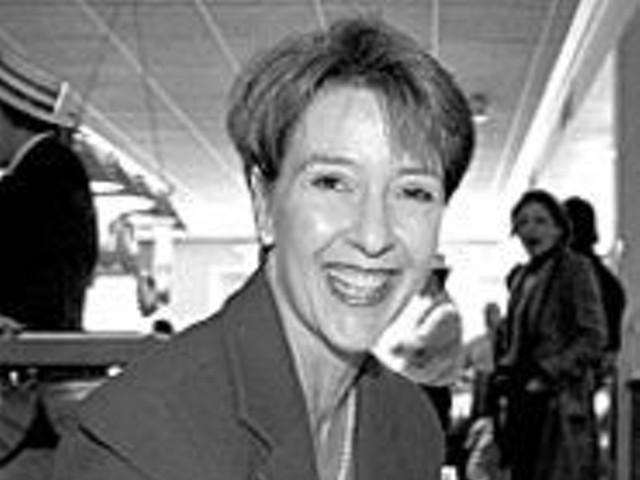Farr is a Republican, but he doesn't toe the party line. His political heroes include Bill Clinton, Jesse Jackson and even William Lacy Clay Sr., the father of his Democratic opponent. On the issues, Farr is apt to give freewheeling, un-GOP-sounding responses.
On gay marriage, for instance: "Civil unions, I have no problems with. Let's say I were a homosexual, and my wife Tonya was a man -- call her 'Tony' -- and something happened to me where I passed on. Under the current scheme of things, Tony would not be able to receive any benefits. I paid Social Security all my life, so she -- he -- should be entitled to it. It's only fair."
Farr, who voted for George W. Bush in 2000 and Bill Clinton in 1996, gained notoriety for a partisan remark he made in August while piloting a train from Kansas City to St. Louis. The train was forced to wait two hours until the westbound train -- carrying John Kerry and John Edwards -- had passed by. To lighten the mood of irritated passengers, Farr suggested over the PA system that the voyagers "should vote accordingly in November." Amtrak brass was not amused and suspended Farr without pay. He resigned a few weeks after the incident.
Farr regrets the remark but says he probably would have made the same comment if the Bush campaign was holding up the train.
"I am absolutely livid when the president comes here, because when they go downtown, they block every exit. I can't get on the highway to run out to Del Taco. And I'm a big Del Taco fan."
A former high school football and track star with a history degree from the University of Missouri, Farr has gone through some dramatic changes since college. He's added 60 pounds, for one thing -- and he's shed his Democratic Party affiliation.
"My parents are Democrats. But I did my homework on the two. I just didn't like what I saw in the Democratic Party platform." He cites his opposition to abortion, stem-cell research and big government as motivations in turning elephant.
Farr's convictions were so strong that, after leaving Amtrak, he decided to take on William Lacy Clay Jr., the popular two-term First District Democrat. (His wife, an account executive, takes care of the bills.) Farr ran unopposed in the Republican primary.
"We need a change in leadership in the First District -- someone who's not going to pick old wounds open," says Farr. "We're the fourth most racially segregated city in the nation. But now, poor black folks live with poor black folks, and poor white folks live with poor white folks. We need to address these issues.
"I just don't think that the people of this district get what they deserve from Lacy," he continues. "I've heard time and time again about people who had serious problems, called his office and never heard anything back. Then, a few months later, they got a calendar. That's my thing: I'm going to be available and accountable."
Farr adds: "My message is less focused on the Republican Party than other people's. I am a Republican, but I don't go out and beat the Republican drum; I don't say I'm going to join other Republicans in Congress and do these other things. I talk about things that are serious to people, things that they know and I know."
The Missouri Republican State Committee gave the gregarious, fast-talking Farr all the money he requested for his campaign: $500. Why so little? "The more you request, the more they control you," Farr says.
Farr runs his modest campaign out of the basement of his home. Headquarters are housed in a 400-square-foot area with two tables, a few rolling chairs and a computer. He says he's distributed 500 lawn signs. Including the money given him by the Missouri GOP, Farr says he's raised about $6,000. He won't accept political-action committee money and recently returned a $750 check from a pro-life PAC.
PAC money or not, it's going to be almost impossible to touch Clay, who presides over an overwhelmingly Democratic district. Clay has raised more than $270,000, according to the Federal Election Commission. Farr is predicting victory November 2, but the political pulse-takers figure he's got two chances -- slim and none.
His campaign appears so quixotic that some political scientists speculate Farr's electoral exercise may be of the sacrificial-lamb variety, intended to help Republican candidates at the top of the ticket.
"If Missouri Democrats don't win 90 percent of the black vote, they won't win a statewide election," observes Jeff Smith, a Washington University political science professor who narrowly lost his congressional race to Russ Carnahan in the August primary. "If a candidate can make [Republican nominee Matt] Blunt get 15 percent of the black vote instead of 8 percent, then [Democrat nominee] Claire [McCaskill] won't win."
"Past trends have shown that more African-American voters are embracing the Republican message," says state GOP spokesman Paul Sloca, "so having Leslie Farr on the ticket obviously doesn't hurt."
For his part, Farr sees his campaign as at least partially symbolic.
"I want to make known that each individual is different. I always remind people: You've got good Republicans and bad Republicans, good Democrats and bad Democrats.
"All of my African-American friends remember Strom Thurmond and Jesse Helms picking apart 2 Live Crew and Bill O'Reilly picking on Ludacris," Farr says. "But Ludacris is one of my favorite rappers! Every Republican is different. We're a large party with varying opinions.
"The Republican Party falls more in tune with traditional African-American values on things like abortion, taxes, school choice and gay marriage," he continues. "If you asked an African-American person on the street what they believed in, they would probably agree with those."
Farr says Democrats have done wrong by blacks in a number of other ways, most recently with a bill -- co-sponsored by Clay and other black Democrats -- to reinstate the draft.
"I think it was a bill put there to scare people," Farr says, echoing a common misconception in the black community that the Bush administration plans to bring back the draft. "Nobody wants a draft again. Their goal is to scare black votes from Bush." House Republicans recently brought the bill to a vote, and it was defeated 402-2. Even Clay voted against it.
Farr says his campaign is focused on "good government," on putting aside partisan differences and improving the quality of life for the type of people who live in his neighborhood. His campaign slogan is "Principle and policy over politics." But he's had trouble getting his message out and building name recognition. In fact, a volunteer who answered the phone at the Missouri Republican State Committee in Jefferson City thought Leslie Farr was a woman.
Part of his recognition problem, Farr contends, has been the lack of one-on-one encounters with his opponent. Farr offered to arrange an evening debate at a north St. Louis church, but Clay declined, preferring to make a joint appearance at a Creve Coeur-Olivette Chamber of Commerce campaign forum breakfast on October 21.
"He was like, 'People will see us there, don't you think?' and I was like, 'Lacy, it's 7:30 in the morning in Creve Coeur on a weekday! If you live in north St. Louis, it would be hard to get there. It's gonna be a stretch for me to get there, and I have to be there!"
Says Clay spokesman Steven Engelhardt: "The candidate feels that is an adequate exchange."
Where an adequate political exchange is not taking place is among St. Louis blacks, who, Farr says, "blindly" vote Democratic. And that, he adds, is partially the fault of the GOP.
"They're going to have to come into the African-American community, going to have to shake some hands," he says. For Republicans to make inroads with the black community in our lifetime, Farr maintains, they're going to have to get out of their comfort zones.
"Statewide candidates -- you can't afford to ignore the metro area. You've got to come and present your case. There are going to be some doors slammed in your face, but you have to be dedicated to it," he says. "It may be too late in this election, but it may be worth a try."






